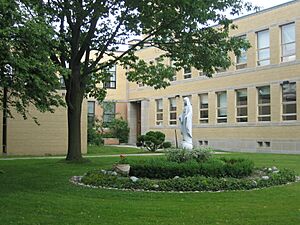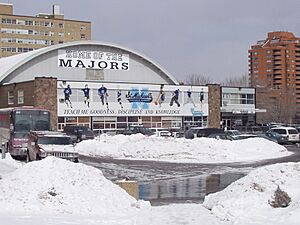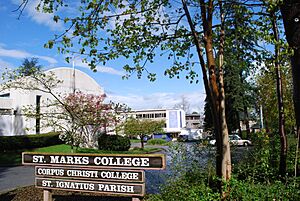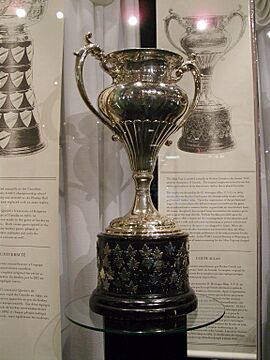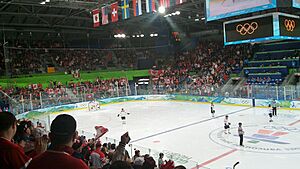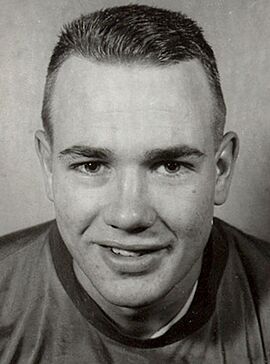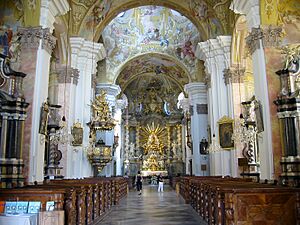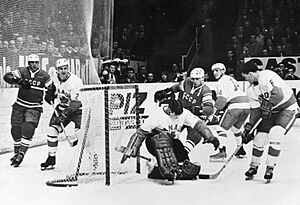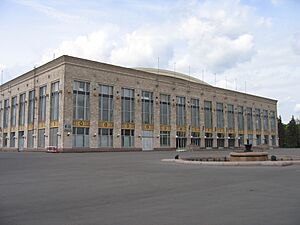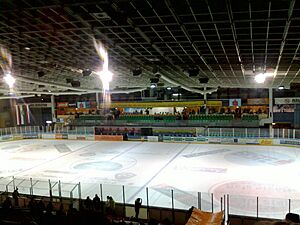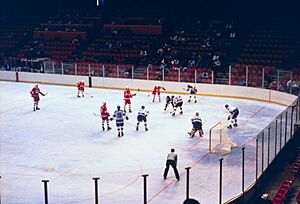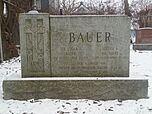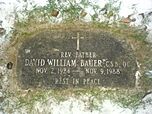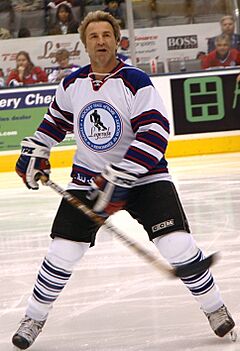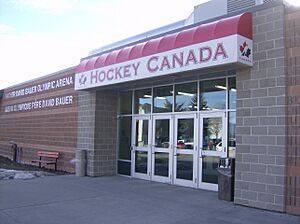David Bauer (ice hockey) facts for kids
Quick facts for kids
David Bauer
CSB OC
|
|
|---|---|
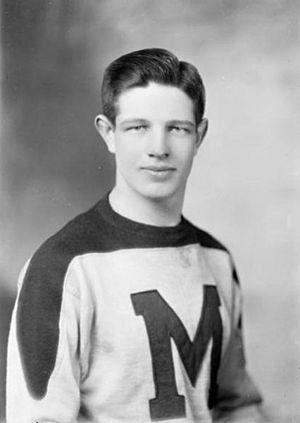 |
|
| Born | November 2, 1924 Waterloo, Ontario, Canada
|
| Died | November 9, 1988 (aged 64) Goderich, Ontario, Canada
|
| Alma mater | University of St. Michael's College |
| Occupation | Catholic priest and educator |
| Known for |
|
| Family | Bobby Bauer (brother) |
| Awards | |
| Honours |
|
Father David William Bauer (November 2, 1924 – November 9, 1988) was a Canadian ice hockey player and coach. He was also an educator and a Catholic priest. When he was 15, the Boston Bruins offered him a contract to play hockey. However, his father advised him to finish his education first.
Not playing professional hockey was a difficult experience for Bauer. It made him want to find more meaning in life and help create world peace. He became captain of the Toronto St. Michael's Majors and helped them win the 1944 Memorial Cup. Later, he became a Catholic priest in the Congregation of St. Basil. He taught at St. Michael's College School and coached hockey there.
Bauer also worked to shorten the hockey season for student athletes. He coached the St. Michael's Majors to another victory in the 1961 Memorial Cup. In 1961, he moved to St. Mark's College at the University of British Columbia (UBC). He coached the UBC Thunderbirds for two seasons. He led them to the finals of the 1963 CIAU University Cup.
Bauer suggested a new idea to the Canadian Amateur Hockey Association. He wanted a team of Canadian university students and senior ice hockey players to represent Canada. This was a big change from how things were done before. In September 1963, he started the Canada men's national ice hockey team program. He looked for players who were good athletes and good students. He wanted them to be dedicated to their studies and training.
He helped players get ready for the larger international ice hockey rink and different ice hockey rules. He also wanted to change Canada's reputation for rough play. Canada finished fourth at the 1964 Winter Olympics. There were claims that the rules were changed at the last minute, costing Canada a medal. Bauer later managed the national team. They won bronze medals at the 1966 and 1967 World Championships, and at the 1968 Winter Olympics. He also managed the national team at the 1980 Winter Olympics.
When Canada stopped playing internationally in the 1970s, Bauer taught at hockey schools in Japan. He also coached the Austria men's national ice hockey team in 1973. Throughout his life, he believed hockey could teach life lessons. He wanted players to get an education. Bauer received many awards, including being inducted into the Hockey Hall of Fame. He was also made an officer of the Order of Canada. Two arenas are named after him: the Father Bauer Arena and the Father David Bauer Olympic Arena.
Contents
Growing Up and Family Life
David William Bauer was born on November 2, 1924, in Waterloo, Ontario. His family came from Bavaria and settled in Waterloo. His father, Sir Edgar J. Bauer, made automotive supplies. He was also a Knight Commander of the Order of St. Sylvester. Edgar Bauer was also president of Globe Furniture and the Waterloo Fire Insurance Company. He served on the Waterloo City Council. David's mother, Alice Bertha Hayes, was active in the Catholic Women's League of Canada.
David was the youngest of 11 children. He had five brothers and five sisters. As a child, he went to St. Louis Separate School. Then he spent three years at St. Jerome's College School. He played pond hockey in Victoria Park with friends. His family later built an ice rink at their house. It had side boards, painted lines, and floodlights.
All of Bauer's brothers played ice hockey and won championships. Bobby Bauer won two Stanley Cups with the Boston Bruins. Bobby and Frank won the 1934 Memorial Cup with the Toronto St. Michael's Majors. Eugene won a championship with the Kitchener Greenshirts in 1935. Jerry and Ray won a championship with the Waterloo Siskins in 1940.
Hockey Dreams and Education
Bauer wanted to play in the National Hockey League (NHL). In October 1941, he went to a training camp for the Boston Bruins. He was offered a contract to play for the Boston Olympics, a team connected to the Bruins. But his father said he was too young for professional hockey. He insisted that David should finish his education first. Bauer later said it was hard not to follow his dream. This made him look for a deeper purpose in life.
He once said, "The national team idea started when I was 15. My father told me I would get an education before becoming a professional hockey player. He also taught me that I had to use my talents for God. This meant not just for myself, but also to help bring about world peace."
Bauer returned to St. Jerome's for another year. Then he went to St. Michael's College School, like his brothers Frank and Bobby. He played hockey there. Bauer was the team captain for the Toronto St. Michael's Majors from 1942 to 1944. He was a great student and played as a left winger. His teammates saw him as a gentleman and a role model.
John McCormack, a player from that time, said, "Dave Bauer was a class act. He could have been a great player. He had more determination than Bobby [Bauer]. He had lots of talent. When it came to determination, no one was better. He would have made it to the NHL easily if he had wanted to."
In the 1943–44 season, Bauer and the Majors reached the finals for the J. Ross Robertson Cup. They lost to the Oshawa Generals. Because of wartime rules, the Generals could add players from other teams. Bauer played for the Generals and helped them win the Eastern Canada championship. They then won the 1944 Memorial Cup, becoming Canadian junior champions. Bauer scored four goals and five assists in that championship series.
Bauer earned two awards for athletics at St. Michael's College School. He also played golf, tennis, and baseball. He was the quarterback for the school's football team. His football team had a perfect season in his final year.
Bauer played one last game for the Majors in the 1944–45 season. He then joined the Canadian Army on November 24, 1944. All his brothers served in World War II. While in the army, Bauer played hockey for the Royal Canadian Postal Corps in Ottawa. He also played briefly with the Windsor Spitfires. After leaving the army, he went to the University of Toronto. His playing career ended with the University of Toronto Varsity Blues in the 1945–46 season. This was when he began studying to become a priest.
Playing Statistics
| Regular Season | Playoffs | |||||||||||||
|---|---|---|---|---|---|---|---|---|---|---|---|---|---|---|
| Season | Team | League | GP | G | A | Pts | PIM | GP | G | A | Pts | PIM | ||
| 1942–43 | Toronto St. Michael's Majors | OHA Jr. | 20 | 10 | 11 | 21 | 10 | 6 | 2 | 8 | 10 | 2 | ||
| 1943–44 | Toronto St. Michael's Majors | OHA Jr. | 25 | 12 | 25 | 37 | 20 | 12 | 7 | 5 | 12 | 12 | ||
| 1944 | Oshawa Generals | Memorial Cup | – | – | – | – | – | 7 | 4 | 5 | 9 | 4 | ||
| 1944–45 | Toronto St. Michael's Majors | OHA Jr. | 1 | 1 | 1 | 2 | 0 | – | – | – | – | – | ||
| 1944–45 | Windsor Spitfires | WCHL | 6 | 2 | 5 | 7 | 2 | – | – | – | – | – | ||
| 1944–45 | Royal Canadian Postal Corps (Ottawa) | ONDHL | 10 | 2 | 5 | 7 | 4 | – | – | – | – | – | ||
| 1945–46 | University of Toronto Varsity Blues | CIAU | 5 | 1 | 5 | 6 | 2 | 1 | 0 | 1 | 1 | 0 | ||
| Totals | 67 | 28 | 52 | 80 | 38 | 26 | 13 | 19 | 32 | 18 | ||||
Becoming a Priest and Teacher
In 1946, Bauer went to Richmond Hill. He joined the Congregation of St. Basil to study for the priesthood. He made his religious vows on September 12, 1947. He then returned to the University of St. Michael's College at the University of Toronto. He earned a Bachelor of Arts degree in philosophy in 1949. He was influenced by thinkers like Jacques Maritain and Christopher Dawson. Bauer earned his teaching certificate in 1951.
In 1952, the Bauer family helped fund a monastery in St. Agatha. Bauer became a Catholic priest on June 29, 1953. He was ordained at St. Basil's Church in Toronto. He held his first mass as a priest in Waterloo in 1953.
Coaching and Education at St. Michael's
Bauer taught at St. Michael's College School from 1953 to 1961. He wanted the education system to create wise leaders. The Basilian fathers ran the school. Their motto was "Teach me goodness, discipline and knowledge." Bauer taught ethics, religion, theology, and history. He also coached the hockey and football teams. In January 1957, he became the assistant principal.
Bauer was on the junior ice hockey council for the Ontario Hockey Association (OHA). He coached and managed teams at all levels at St. Michael's. He protected his players from professional teams trying to sign them too early. He believed players needed more time to grow. He and the Basilian fathers wanted a shorter schedule for the Toronto St. Michael's Majors. They felt the long season hurt students' academic studies.
In 1960, Bauer became the head coach and general manager of the Majors. He focused on strong defensive play and how to take hits safely. Sometimes, he had players switch positions. This helped them understand their teammates' roles. The Majors finished second in the season. They then won the OHA championship. The Majors went on to win the 1961 Memorial Cup in six games. This was the school's fourth Memorial Cup.
The Basilian fathers were still worried about the long season and travel affecting studies. They also saw hockey becoming more like professional leagues. The Majors had played 98 games that season. St. Michael's decided to leave the top junior hockey league. Bauer later said they regretted leaving. But they felt the school was important for recreation in Canada.
After the announcement in June 1961, Bauer put Jim Gregory in charge. The Majors played one more season with a shorter schedule. The team then moved to Neil McNeil High School and became the Toronto Neil McNeil Maroons.
Moving to St. Mark's and UBC
The Basilian fathers moved Bauer to St. Mark's College at the University of British Columbia (UBC) in 1961. He taught ethics to nurses there. He was also the dean of residence and chaplain at St. Paul's Hospital.
Before he arrived, UBC's athletics department asked him to coach the UBC Thunderbirds. He agreed to help for the 1961–62 season. Players kept asking him to take over as head coach. He finally agreed in January 1962.
More players wanted to join the team after Bauer became coach. Bob Hindmarch, a UBC teacher, became the team's general manager. He helped players with their finances and studies. UBC did not have its own rink. They practiced at other arenas and played games at the Vancouver Forum. Bauer taught his team to focus on defense. He sometimes canceled practices so players could catch up on schoolwork. The Thunderbirds won two exhibition games but no league games that season.
In the 1962–63 season, 120 players tried out for the Thunderbirds. Bauer picked the best skaters. He set up exhibition games against other senior teams. The Thunderbirds played an exhibition game against the Soviet Union national ice hockey team but lost 6–0. The Thunderbirds had a rivalry with the Alberta Golden Bears for the Hamber Cup. They had never won it since 1950. But Bauer's team won their first Hamber Cup that year.
Bauer led the Thunderbirds to eight wins, one loss, and one tie in the regular season. They won their league title and went to the national championship. The Thunderbirds reached the final game of the Canadian Interuniversity Athletic Union men's ice hockey championship. They lost the CIAU University Cup final 3–2.
During the season, Bauer worked with Vancouver alderman Frank Fredrickson. They secured money to build a new arena. The Thunderbird Sports Centre opened in September 1963.
Canada's National Hockey Team
A New Idea for International Hockey
Bauer and his brother Ray went to the 1962 Ice Hockey World Championships. This was the first time North America hosted the event. The Bauer family had a history of playing internationally. Ray Bauer played for Canada in 1949. Bobby Bauer coached the Kitchener-Waterloo Dutchmen at the 1956 and 1960 Winter Olympics.
The Canadian Amateur Hockey Association (CAHA) usually picked an amateur senior team to represent Canada. This was often the team that won the Allan Cup. Ray Bauer had to pay for some team expenses through his family business. This was because the government and CAHA didn't cover all costs. The Bauers felt it was unfair for one city to pay for the whole country's team. Bauer talked to American coaches at the World Championships. He learned they had detailed plans for the 1964 Olympics. Canada, however, didn't even know which team would represent them.
Bauer suggested that Canadian universities and colleges could represent the country. He felt young men would like a program that combined education and hockey. He thought a group of students could be joined by the best senior players. He discussed this with CAHA leaders. His idea was approved in principle in May 1962. It got final approval in August 1962. The Canadian Olympic Association also approved it in October 1962.
Professional leagues like the NHL didn't like the idea. They would be competing for the same players. Some people criticized the plan. But many journalists supported it. Scott Young wrote that it was the best hockey news in Canada in years.
Building the National Team
Bauer and UBC officials made a financial agreement for the new team in January 1963. Bauer started the national team program in September 1963. He brought in Bob Hindmarch as general manager and assistant coach.
Bauer looked for players who were good athletes and good students. He prepared them for the larger international ice hockey rink and different ice hockey rules. In Europe, body checking was only allowed in a team's defensive zone. He wanted to change Canada's reputation for rough play and hooliganism on the ice.
The team had a regular schedule. They went to classes during the day. They practiced in the late afternoon. They studied in the evening. Most of the team lived in a house on the UBC campus. This house used to be a radio station during World War II. The team worked together to fix up the house, which helped them bond. Bauer hired a German housekeeper named Ma Byers. She cooked for the players and acted like a mother figure.
Bauer looked for money from Canadian businesses. He received donations from people like Max Bell and Charles Hay. The team also got help from the Canadian Pacific Railway. Bauer's family also contributed funds. The Government of Canada later helped after a journalist wrote about the players being "starving scholar athletes." Bauer also arranged for the players to do community service. This helped get more funding from politicians.
The national team played its first game in Canadian jerseys on November 12, 1963. They won an exhibition game against the Melville Millionaires. The team played 33 exhibition games across Canada to prepare for the Olympics.
1964 Winter Olympic Games
The Ice hockey at the 1964 Winter Olympics were held in Innsbruck, Austria. Canada won its first game 14–1 against Yugoslavia. They then won against Switzerland (8–0), Germany (4–2), Finland (6–2), and the United States (8–6).
During a game against Sweden, player Carl-Göran Öberg broke his stick. He tossed it aside, and it hit Bauer in the face, causing a cut. Bauer told his players to stay calm and not retaliate. Canada won 3–1. Bauer forgave Öberg. The next day, Bauer invited Öberg to watch a game with him. Canada lost its last two games to Czechoslovakia (3–1) and the Soviet Union (3–2).
Canada, Czechoslovakia, and Sweden all had five wins and two losses. Canada thought they had won the bronze medal based on goal difference in games between the tied teams. But at the medal ceremony, they learned they were fourth. This was based on goal difference from all seven games. Players and CAHA president Art Potter accused International Ice Hockey Federation (IIHF) president Bunny Ahearne of changing the rules last minute. Bauer was one of only three Canadians at the ceremony. He received a gold medal for his good sportsmanship during the stick incident.
After the Olympics, the national team toured Europe. They met Pope Paul VI in the Vatican City. When Bauer returned to Canada, he discussed the academic impact on the national team. Seven players had dropped out of courses, and nine completed less than half. But Bauer felt it was still possible to help students on the national team.
At a CAHA meeting in May 1964, Ahearne said the decision to place Canada fourth was correct. Former CAHA president Robert Lebel agreed. Bauer was given approval to continue the national team program. He moved from coaching to a managing and advisory role.
The National Team: 1965 to 1969
Bauer often traveled with the team on international tours in the late 1960s. As a priest, he gained followers in Europe. He held mass in many places, including motels, churches, and friends' homes. In Austria, he held mass at the Mariatrost Basilica.
In 1965, the CAHA moved the national team program to Winnipeg. They merged it with the Winnipeg Maroons. The Maroons were a top senior team. Their coach, Gord Simpson, continued to coach the national team. Players attending UBC moved to the University of Manitoba. Bauer continued to recruit players. He saw this merger as the start of a truly national team in the center of Canada.
Bauer put together a mix of experienced and student players for the 1965 Ice Hockey World Championships. Canada finished fourth. Bauer was happy with the result, as the team had only been together for three weeks. He felt it would be hard for Canada to win the World Championships soon.
After the CAHA failed to host the World Championships in 1967, Bauer hoped it would inspire more support for Canadian hockey. In April 1966, Bauer said, "Our biggest problem is making Canadians out of all of us. We have to start somewhere and help our own Canadian athletes."
Bauer recruited Jackie McLeod to coach the national team. They both listened well to players. At the 1966 Ice Hockey World Championships, Bauer was frustrated with the officiating. Two Canadian goals were disallowed in a loss to Czechoslovakia. The players wanted to quit before the final game against the Soviet Union. Bauer convinced them to keep playing. Canada lost the final game and won the bronze medal.
The Canadian Hockey Foundation was created in 1966 to manage the national team. This allowed the team more freedom in choosing players. Bauer said the foundation had limits because it couldn't accept tax-exempt donations.
In 1967, the CAHA hosted a Canadian Centennial tournament. They invited teams from the United States, Soviet Union, and Czechoslovakia. Bauer's team won all three games. They defeated the Soviet Union 5–4 in the final. At the 1967 Ice Hockey World Championships, Bauer's team won four of seven games. They lost to the Soviet Union 2–1 and finished with the bronze medal.
The CAHA created a second national team for the 1968 Olympics. Bauer recruited Jack Bownass to coach this team in Ottawa. Bauer saw both teams as equal. He didn't like the media calling them "A-team" and "B-team." At ice hockey at the 1968 Winter Olympics, Canada won five of seven games and earned the bronze medal. Canada had a chance to win gold in the final game against the Soviet Union. But they lost 5–0. Bauer said it was the best game he had seen the Soviets play.
Hockey Canada was formed in 1968. It took over managing the national team in 1969. Bauer became a board member. The board decided to focus on allowing professional players in the World Championships. Hockey Canada got money from the government for the national team to travel to the 1969 Ice Hockey World Championships in Sweden. Bauer's team was new to international play. They lost twice each to the Soviet Union, Czechoslovakia, and Sweden, finishing fourth.
National Team Break and Return
Bauer was against using professional players at the World Championships. His time with the national team ended in 1969. This was when Canada was allowed to use a few professionals for the 1970 Ice Hockey World Championships. On January 4, 1970, Canada stopped playing internationally. This was due to disagreements with the IIHF and the International Olympic Committee about using professionals. The national team was soon disbanded.
Bauer stayed involved with hockey. He advised coaches and players at UBC. He helped Tom Watt pick a Canadian team for the 1972 Winter Universiade. But he chose not to coach or manage since Canada wasn't playing internationally yet.
Bauer wrote an article in the Toronto Sun on September 2, 1972. He explained why he expected Canada's professional players to win the 1972 Summit Series. He believed Canada's talent was clear. He thought the younger Soviet team would use their fitness and defense to limit scoring. He also said, "I think they've realized they've reached a certain level and they could improve only by playing our professionals." He was interviewed on TV during game three. He said the losses showed problems in Canadian hockey. He felt Canada could learn from the Soviets. Bauer hoped the series would bring unity to Canada and better international relations.
Coaching in Japan and Austria
At the 1968 Winter Olympics, Bauer met Yoshiaki Tsutsumi. He was the head of the Japan Ice Hockey Federation. Tsutsumi asked Bauer to help with hockey programs in Japan. Bauer first went to Japan in October 1968. He spent a month holding hockey clinics across the country. He continued to visit Japan for two six-week periods each year. His lessons on personal growth and discipline were well-received in Japanese culture.
Bauer was not paid for his work. But his travel and expenses were covered by the Seibu Group. Japanese players visited Canada for hockey tours in return. Bauer sometimes coached the Seibu team in league games. But he couldn't lead them to a championship. He declined an offer to move to Japan permanently. He continued working there until 1978. He remained friends with the Japan Ice Hockey Federation. He helped suggest Canadian coaches and players to visit Japan.
The Austrian Ice Hockey Association invited Bauer to coach the Austria men's national ice hockey team. This was for the 1973 Ice Hockey World Championships in Graz. The team finished fifth and avoided moving down to a lower group.
1980 Winter Olympic Games
The CAHA agreed to return to international play in 1977. This was when professional players were allowed. In October 1977, Bauer urged for a plan for ice hockey at the 1980 Winter Olympics. He wanted to avoid embarrassment for Canada. Hockey Canada named Bauer as the managing director for the Olympic team. The team was still limited to amateur players.
Bauer set up a six-month training camp. He wanted to build teamwork and systems. About 150 junior and college players attended. He felt a lot of work was needed to improve the talent level. It was hard to keep talented players because professional teams were signing them. Clare Drake, Tom Watt, and Lorne Davis were named coaches. Bauer let the coaches do their job. But he gave them reading materials on topics he wanted the players to learn.
After the Olympics, Bauer gave an interview. He made no excuses for the sixth-place finish. But he felt that a permanent national team had been created.
He said, "The experiment has been successful overall. The whole idea was to offer another choice. This choice would include some form of education. It would also offer experiences beyond hockey for personal growth."
Later Life and Legacy
Bauer was asked to help the China men's national ice hockey team in 1981. But he had shingles and couldn't travel. He recommended another coach instead.
Bauer became vice-president of Hockey Canada in 1981. He was also chairman of the national team program for the 1984 Winter Olympics. He continued teaching at St. Mark's and helping the UBC Thunderbirds hockey team. He wanted to keep the same national team together from the 1980 Olympics. He raised $400,000 for the next Olympics. His involvement with the national team slowly decreased. By 1984, he was in an advisory role with Hockey Canada.
Bauer spent his last months at his family cottage. He had surgery in July 1988. He died from pancreatic cancer on November 9, 1988. He was remembered with services in Toronto and Waterloo. He was buried in the family plot in Mount Hope Cemetery in Waterloo.
Bauer's Coaching Ideas
Bauer believed players should stay in amateur hockey to get an education. He felt that growing professionalism hurt learning opportunities. He thought hockey was a way to teach life lessons. He believed it helped boys become men. He built the national team based on his experiences at St. Michael's. Bauer said, "We try to give our players a well-rounded education. This includes not just ice skills, but also mental and moral training." He also stated, "If you can improve the boy as a person, he will improve as a hockey player." As a Basilian priest, Bauer believed in educating the whole person.
Bauer did not like bad language or fighting. He wanted his players to be gentlemen. He emphasized discipline, teamwork, and fair play. According to national team manager Rick Noonan, Bauer was gentle. He "would consult and involve everybody" on the team.
Impact on Players
Bauer had a big impact on players for the Canadian national team. Glenn Anderson said, "Bauer's influence on me is huge. He knew hockey inside and out. But he cared more about the human spirit. He had such inner strength, and it rubbed off on me. I was lucky to have met him. Bauer taught us more than a game. He taught us how to believe in ourselves to be the best."
Brian Conacher said, "I know if I hadn't played for Father Bauer, I would never have made it to the NHL. He taught me the discipline and skills I needed. Father Bauer cared deeply about his players' mental, physical, and spiritual well-being. He was truly like a father to us. He was a very inspiring coach. He left a lasting mark on every young man he met."
Awards and Recognition
Bauer was one of the first people appointed to the Order of Canada in 1967. He was made an officer of the Order of Canada on July 6, 1967. This was for his work in ice hockey and with the Canadian national team. He was officially honored on November 24, 1967. Bauer was inducted into the Waterloo County Hall of Fame in 1972. He was also inducted into Canada's Sports Hall of Fame for hockey in 1973.
After his death, Bauer was inducted into the Hockey Hall of Fame in 1989. He was also inducted into the Olympic Hall of Fame in 1992. Other inductions include the UBC Sports Hall of Fame (1996), the IIHF Hall of Fame (1997), the BC Hockey Hall of Fame (2009), and the Ontario Sports Hall of Fame (2012).
Lasting Impact
The Canadian Press described Bauer as "The kind Roman Catholic priest who brought Canadian hockey into the modern age of international play." His national team idea was called "the most nobly conceived of all Canadian hockey enterprises." Kevin Shea of the Hockey Hall of Fame called Bauer "an inspirational coach, a caring educator, a master motivator." He was "devoted to the idea that education and hockey could mix."
Brian Conacher said, "Father Bauer was a visionary. He was a pioneer in seeing how good European hockey had become. It became clear that the old Canadian style—rough and tough—was outdated."
Rick Noonan said, "Father Bauer worried that people would misunderstand him because he was a Basilian priest. He worried they would think he was trying to make everyone Catholic. But he was very inclusive." If a player used bad language during a game, Bauer would gently put a hand on their shoulder and say, "Now, now, I do the praying around here." Tom Watt, an assistant coach, said, "Father Bauer is a great Canadian. Sometimes when you talked about hockey, the priest came out. And sometimes when you talked to a priest, the hockey came out of him."
Two hockey arenas are named after Bauer. The Father Bauer Arena opened in 1963 at UBC. The Father David Bauer Olympic Arena in Calgary was named for him in 1986. It was a training facility for the Canadian national team. A street in Waterloo is also named Father Bauer Drive.
Scholarships at St. Michael's College School and UBC are named for Bauer. Money from the sale of Bauer's family cottage helped fund the Quest Program. This program helps communicate faith using electronic means.
The creation of the national team was featured in a Heritage Minutes clip. Greg Oliver wrote a book about Bauer called Father Bauer and The Great Experiment.


